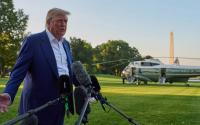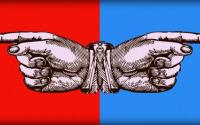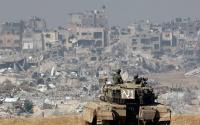John Harris15 Februaray, 2008
The first thing TB said was that he had slept badly. So had I." So began Alastair Campbell's diary entry for Saturday February 15 2003, the day that Tony Blair marked yet another step along the path to war with a belligerent address to the Labour party's spring conference in Glasgow, and a huge mass of humanity congregated in London to have one last go at pulling him back.
"I do not seek unpopularity as a badge of honour," Blair told his audience. "But sometimes it is the price of leadership and the cost of conviction." In retrospect, the words suggest the caricature that was already beginning to define him - messianic, astride his white charger, caring less about the ebb and flow of public opinion than "what I believe" - but the historical record suggests that the anti-war march caused him no little unease. "Even I am a bit worried about this one," he told Campbell. Reading Anthony Seldon's authoritative Blair Unbound, what is particularly striking is that the split that was opening within the Labour party extended all the way into Blair's inner circle. As they worked on his speeches and soundbites, some of his closest aides had brothers, sisters and friends - even children - who were getting ready to protest.
It seems an awfully long time ago now, that chilly winter's day. Iain Duncan Smith, as zealous an advocate of military action as Blair, was the leader of the Conservative party; Charles Kennedy was in charge of the Lib Dems. The UK's bestselling pop single was the work of a faux- lesbian Russian duo called Tatu. BBC Choice had just become BBC3; that year's hot tips for the Oscars included Chicago, The Pianist and Bowling for Columbine.
At first glance, the march seems every bit as far-flung - though it does not take much to bring the memories back in a properly Proustian flurry. Who, after all, could forget coming up to Hyde Park Corner, looking back down Piccadilly and marvelling at how vast this thing was? Remember "Bliar", and "Make Tea Not War", and that ocean of home-made placards and banners - "Tom and Sally say No", "War is menstrual envy", "Tony Blair is really annoying"? What about that dizzying sense that, just for once, the British left had managed to catalyse a gathering that took in everyone from white pensioners from the shires to young Muslims from the inner cities?
As the following day's Observer marvelled, "There were country folk and lecturers, dentists and poulterers" - poulterers! - "a hairdresser from Cardiff and a poet from Cheltenham"; even, as one first-time marcher noted, "girls with good nails and really nice bags", all united by a mood that was warmly inclusive and endlessly upbeat. By way of covering the Heat magazine angle, they were accompanied by celebrity marchers whose diversity seemed almost comical: Kylie Minogue, Pete Postlethwaite, Kate Moss, John Hurt, Jarvis Cocker. And just to take things decisively into the realms of the absurd, the great Chris Eubank brought along his famous huge truck, emblazoned with the classically Eubank-ian message, "Integrity is the only course - not war! Reason should be our only weapon."
In Saturday, the novel he set on the day of the march, Ian McEwan captured its celebratory atmosphere in an observation by his central character, Henry Perowne, later endorsed by the author himself: "All this happiness on display is suspect. Everyone is thrilled to be together on the streets - people are hugging themselves, it seems, as well as each other. If they think - and they could be right - that continued torture and summary executions, ethnic cleansing and occasional genocide are preferable to an invasion, they should be sombre in their view."
This is surely a pretty risible point: pious, for a start, and a denial not only of traditions long embedded within radical politics all over the world - brass bands, musicians on flatbed trucks, drums and whistles, you name it - but also simple anthropological fact. Marches are always either angry or celebratory. In this instance, the atmosphere of optimism surely arose from two things: the modern myth of political apathy being exploded; and a massed belief that with all these people on the streets, the government might have changed its mind, and thus at least slightly reduced the chances of a war that would result in disaster (and make no mistake: though they weren't allowed much airtime, even then, plenty of voices predicted that the invasion would result in chaos). Of late, a high-ranking American politician has been trading on much the same feeling; Barack Obama calls it the audacity of hope.
But what happened? Where did all that energy go? There are all kinds of possible answers, focused on everything from the tactics of the organisers to the idea that modern protest might be a banal matter of registering one's individual dissent - "Not in my name," as the slogan put it - then going home happy. Some people are yet more cynical, claiming that the march was another one of those modern Dianaesque spasms, indicative of not much more than a fleeting national pang of banal humanitarian sentiment, and that very modern desire to break out of our atomised lives and seek solace in crowds.
But never mind them. There are reasons to take what happened that day much more seriously, chiefly because the march both dramatised and accelerated an ongoing disconnection between millions of Britons and the people who affect to speak in their name. In other words, you might like to think of Saturday February 15 2003 as the day that politics stopped working.
For anyone who might be unfamiliar with the nuts and bolts of that day's events, a brief reminder. In partnership with the Campaign for Nuclear Disarmament and the Muslim Association of Britain, the march was organised by the Stop the War Coalition (STWC), an alliance of activists from - among other places - Labour's left, most of the major trade unions, Plaid Cymru, the Greens, the Communist Party and the Socialist Workers' party. They had come together 10 days after the events of September 11 2001 to oppose attacks on Afghanistan, but with the Bush administration bent on attacking Iraq and Blair apparently determined that Britain should join in, the STWC became something rather unexpected: the unlikely focus for a snowballing mood that extended way beyond the usual leftist suspects.
In Birmingham, the march's organisers reserved well over 100 coaches - enough to carry at least 5,000 people - and then tried to get hold of even more, only to find that every coach company for miles had been booked up. In Liverpool, the local STWC had organised its previous outings using a colour-coded system - blue coach, green coach, red coach - but this time found that they had run out of colours, and were reduced to a byzantine system of patterns, so that some people made their way to London on the "leopardskin coach". At service stations on the M4, protesters marvelled at the great fleet of vehicles making its way from Wales and the West Country; on the morning trains into Paddington there was standing room only. It should not be forgotten, moreover, that London was not the only location for an unprecedentedly huge event. Quite apart from the events that took place overseas, 10,000 marched in Belfast, and as many as 100,000 turned out in Dublin. In Glasgow, 50,000 people pitched up outside the aforementioned Labour conference.
Even with hindsight, untangling any coherent set of ideas at the heart of what happened can easily seem impossible. Thanks to the Muslim Association of Britain (and, perhaps, the left's habit of never sticking to one demand when you can have two), the march's official top line was "Don't attack Iraq - Freedom for Palestine". The event's hardcore were the same people who had opposed military action in Kuwait, Kosovo and Afghanistan - and this time viewed the supposedly crucial issue of UN endorsement as a mere distraction. Viewed from certain angles, moderation - not to mention sophistication - seemed in very short supply. With his usual restraint, Harold Pinter raged from the platform about the US being "a country run by a bunch of criminal lunatics with Tony Blair as a hired Christian thug". Just to keep the church's end up, Ms Dynamite - she was popular back then - claimed, "He who preaches war is the devil's chaplain; he is tarnished by the beast."
This time, however, the posturing was less important than those hairdressers, dentists and poulterers, and the idea that the march spoke for a great swath of the public. In the build-up to February 15, opinion polls suggested that the proportion of the public who supported war had fallen to a low of around 30%. Just over 80% of the public opposed war without the UN's say-so, and a clear majority of Britons disapproved of Tony Blair's handling of an ever increasing crisis. Within that picture, you can discern what brought so many people out: not any hardened ideological position, but a rising anger about where Blair was taking us, and fear that a war fought outside any true international agreement would make an already dangerous world even more hazardous.
But the protest also represented something else, focused not so much on the issue of Iraq as on the sense that mainstream politics was drifting away from the public, and at least some of the marchers felt that in protesting, they might somehow drag Westminster back. Trawling through quotes gathered by the press that day, it's an impression that comes up time and again: "Something's happened recently, to me and so many friends - we just know there's something going wrong in this country. No one's being consulted"; "The government should listen to the people, otherwise what's the point in democracy?"; "America is making the prime minister go against the huge majority of the British people"; "This is not about party politics, but a simple feeling that democracy has been forgotten."
The rest we know. Whether there were one million, or 1.5 million, or 2 million marchers, the event still stands as the biggest ever protest in British history. Once war had been declared, there were more demos through the spring and beyond, though with each one, numbers declined, and the same old voices sounded all the louder. When George Bush came to town that November, some of February's vitality returned - according to the police, 100,000 people marched through the middle of London on a cold Thursday afternoon, though the Stop the War Coalition claimed twice that number. From 2004, however, everything went disappointingly quiet. War had happened - indeed, was still happening - and that was that. Very quickly, February 15 took on the appearance of an aberrant one-off.
To expect the energy created that day to find any long-lasting outlet was perhaps to misunderstand how modern politics works. In different times, some of the marchers might have been eventually propelled towards the Labour party, but the serial contortions of the Blair years surely ruled that out. The single biggest chunk of parliamentary opposition to the war had come from Labour's ranks, and thousands of activists and trade unionists were up in arms, but in the minds of millions, Labour was now branded as the party responsible - and besides, a distaste for dissenting opinions had long been built into New Labour's soul. Once, the party had attracted young activists - Peter Hain springs to mind - who had cut their teeth in CND or the anti-apartheid movement; now, its bright young stars were the kind of wan apparatchiks who presumably watched the events of February 15 with mounting panic.
As proved by their creditable showing at the subsequent general election, the Lib Dems had a better story to tell. But in their rather washed-out rhetoric - the best Charles Kennedy could offer the crowd in Hyde Park was the claim that he had "yet to be persuaded that the case for war has been made" - and decision to greet the outbreak of war with the ratcheting-down of their opposition and an emphasis on "supporting our troops", something was not quite right. Their initial approach to the march spoke volumes: despite its obviously deep and wide support, many of their most senior figures had held to the Westminster cliche whereby February 15 had supposedly threatened to be a potentially dangerous showcase for "anti-Americanism". In a good deal of what they had to say about Iraq, that sense of nervous detachment remained.
Who did that leave? Anti-war feeling undoubtedly gave the Greens something of a fillip. In Scotland, it was a big part of the political story that climaxed last year with the arrival in power of the SNP. It was also the catalyst for the creation in 2004 of the Respect Coalition, the alliance of leftwing activists and Muslims that gave George Galloway the opportunity to become an east London MP, and eventually came to grief when he fell out with the Socialist Workers' party.
Talking to some veterans of the anti-war movement, it is the SWP who are often blamed for its failure to develop into anything with real political oomph: a matter, according to some, of their undoubted organisational expertise always being packaged up with 19th-century rhetoric and crushingly unimaginative tactics. When I spoke, for example, to Morag Reid, a 46-year-old university lecturer from Birkenhead who organised the Stop the War coaches from Liverpool, she painted a grim picture of droves of people who wanted to somehow carry on protesting, but were only met with the dull offer of more trips to London. "Every six weeks, we were being called upon to get people to go down to London on a coach - and tactically, it became pointless," she said. "It was, 'Another one? And another one?' And of course, the media gave the impression that opposition to the war had decreased, but it was interest in going on endless marches to London that had gone down."
All that said, the march did seem to have had one watershed consequence. Given the press's apparent belief that February 15's biggest story was an unexpected day out for Middle England, it was easy to miss, but in what the left termed "Muslim mobilisation", there was something arguably even more remarkable.
Salma Yaqoob is a Birmingham city councillor and activist with what remains of Respect. You might have seen her on Question Time. She has stuck with the George Galloway faction, though when I talked to her, saloon-bar political warfare was much less interesting than her telling of how the anti-war movement had steadied at least some Muslim anxieties, and cut across the politics of violence and separatism.
After the events of September 11, she told me, there was a widespread feeling of "powerlessness and hopelessness", made worse by the idea that if Muslims spoke out about the hardline tilt of American and British foreign policy, they would only make their isolation worse. "When I first started speaking," she said, "there were Muslims telling me, 'Please don't do this - it's going to draw more attention to us.' My own dad said it: 'Look, Salma - this is not the time. They already hate us. They're going to hate us even more if you start criticising the government. Keep your head down.' "
I wondered whether what she said next sounded a little too pat, but still: the march, she told me, belatedly drew thousands of Muslims into politics, and thereby "undercut the appeal of people who were genuinely supporting terrorism". In doing so - and here, she used language at which her old SWP associates would surely blanch - "it encapsulated the best of Britishness. We talk about Britain being multicultural, diverse and tolerant, but it's when you need those things that they become meaningful. The anti-war movement restored a sense of belonging. That's why I'll never, ever think of it as a waste of time."
And there was another story, to do with a slightly quieter sea change. "My mum and my aunties came out," she said. "Their generation had never done that; on any other issue, it had mainly been men. But they felt it was safe for them to do so, and it was their place to do so. It changed them."
What Salma Yaqoob told me was expressed with enthusiasm and no little optimism. The fact that anti-war sentiment eventually played a key role in Labour's anticlimactic showing in the 2005 election and the early exit of Tony Blair only underlines the idea that the march perhaps had more of an effect than some people would have you believe. But the larger tale of what the march and its aftermath say about our estrangement from Westminster still seems bleak. At its heart is a feeling that is still with us: the disorientation that comes from passing through the biggest political rupture in living memory - a matter not just of the disastrous invasion, but the deceit that surrounded it - and beholding a political elite that still wants to keep the public's sustained disquiet at arm's length, and carry on speaking the language of Business As Usual.
In the US, the long build-up to this year's presidential election has seen at least some of their national angst over the war being thrashed out: Hillary Clinton claiming that "knowing what we know now, I would never have voted for it"; Barack Obama taking issue with her record; both Democratic candidates sharply differentiating themselves from the unabashed belligerence being dispensed by John McCain.
Here, unfortunately, the loudest voices in British politics still offer only mealy-mouthed atonement - a lot of talk about supposed failures in "postwar planning", but no public regret about the biggest decisions. For the government, any such move may well be ruled out by the compromises of power, but what about the opposition? In the Conservatives' refusal to recant - David Cameron, lest we forget, remains of the opinion that invading Iraq was "the right thing to do" - surely lies part of the explanation as to why, despite the government's serial problems, the Tories seem unable to make any decisive breakthrough.
The great gap the war put between politicians and the public may still sit within our politics like a dull headache, but just occasionally, it gets some of the attention it deserves. It lay, for example, at the centre of last year's election for Labour's deputy leadership, and led to an episode that spoke volumes about how far we are from any convincing kind of reckoning. When Newsnight screened its own hustings, the left-leaning outsider Jon Cruddas - who, partly thanks to the Iraq factor, finished third, ahead of three members of the Cabinet - reiterated his claim that the government should somehow apologise, "as part of the general reconciliation with the British people over what has been a disaster". Harriet Harman agreed with him. The day after she was elected, she appeared on the Today programme and apparently denied that she had done anything of the kind.
In that about-turn, you could once again make out that awful disconnection between a public who remain cut off from the Westminster game, and a political class that has yet even to begin to make real amends. On their side, there is far too much doublethink and denial; on ours, a feeling of pained distance. Trust is the overarching modern issue, and so it looks likely to remain. To return to Tony Blair's bleary-eyed morning five years ago, our politicians really should be sleeping badly. So should we.






